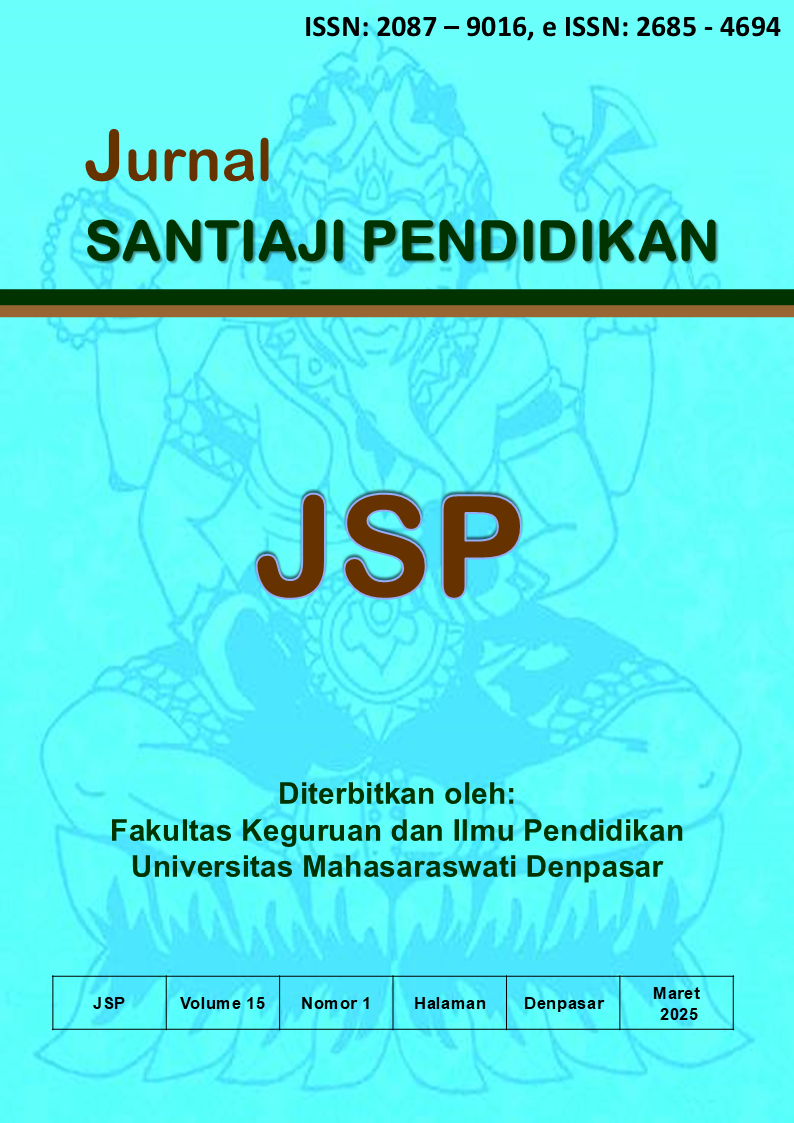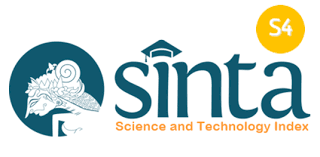PROFILE OF PEDAGOGICAL CONTENT KNOWLEDGE ABILITIES OF PRE-SERVICE STUDENTS
DOI:
https://doi.org/10.36733/jsp.v15i1.10586Keywords:
Pedagogical Content Knowledge, Knowledge Test Simulation, Teacher Professional EducationAbstract
This study aims to describe the profile of Pedagogical Content Knowledge (PCK) abilities among in-service Teacher Professional Education (TPE) students at Mahasaraswati University in Denpasar. A descriptive research method utilizing a survey technique was employed, gathering data through an online Knowledge Test Simulation (KTS) available at https://simulasiup.unmas.ac.id/. The sample comprised 148 TPE students across five fields of study: Indonesian, English, Mathematics, History, and Biology. Data analysis was based on UP simulation scores, which assessed five components of PCK: knowledge of teaching strategies, content knowledge, understanding of students, curriculum knowledge, and evaluation knowledge. The results indicated that most students exhibited a moderate level of Pedagogical Content Knowledge (PCK), with an average score of 41.32 out of a possible 80. Scores varied significantly, ranging from a maximum of 80 to a minimum of 0. Approximately half of the students (50%) fell into the moderate category, while 20% achieved a high category and 5% reached a very high level of PCK. Conversely, 15% were classified as low, and 10% as deficient. The analysis revealed that students' primary challenges lie in effectively integrating content knowledge with pedagogical techniques and developing appropriate student assessments. The study concludes that, although some students demonstrate strong mastery of PCK, the majority require additional support in enhancing their teaching strategies and assessment skills.
Downloads
References
Aminah, N., & Wahyuni, M. P. I. (2019). Keterampilan Dasar Mengajar. LovRinz Publishing.
Bhakti, C. P., & Maryani, I. (2016). Peran LPTK dalam Pengembangan Kompetensi Pedagogik Calon Guru. JP (Jurnal Pendidikan): Teori Dan Praktik, 1(2), 98–106. https://doi.org/10.26740/jp.v1n2.p98-106
Creswell, J. W., & Creswell, J. (2003). Research design. Sage publications Thousand Oaks, CA.
Creswell, J. W., & Creswell, J. D. (2017). Research design: Qualitative, quantitative, and mixed methods approaches. Sage publications.
Dhurumraj, T., & Ramaila, S. (2024). An Analysis of a Physical Sciences Novice Teacher’s Pedagogical Content Knowledge: A Case Study in Kwazulu-Natal. Journal of Educational Studies, 2024(si1), 50–65. https://doi.org/10.59915/jes.2024.si1.4
Gess-Newsome, J., Taylor, J. A., Carlson, J., Gardner, A. L., Wilson, C. D., & Stuhlsatz, M. A. M. (2019). Teacher pedagogical content knowledge, practice, and student achievement† . International Journal of Science Education, 41(7), 944–963. https://doi.org/10.1080/09500693.2016.1265158
Ifrianti, S. (2018). Membangun kompetensi pedagogik dan keterampilan dasar mengajar bagi mahasiswa melalui lesson study. Terampil: Jurnal Pendidikan Dan Pembelajaran Dasar, 5(1), 1–18. https://doi.org/10.24042/terampil.v5i1.2748
Johar, R., & Hanum, L. (2021). Strategi Belajar Mengajar: Untuk Menjadi Guru yang Profesional. Syiah Kuala University Press.
Khairi, A., Kohar, S., Widodo, H. K., Ghufron, M. A., Kamalludin, I., Prasetya, D., Prabowo, D. S., Setiawan, S., Syukron, A. A., & Anggraeni, D. (2022). Teknologi pembelajaran: Konsep dan pengembangannya di era society 5.0. Penerbit Nem.
Lee, E., & Luft, J. A. (2008). Experienced Secondary Science Teachers’ Representation of Pedagogical Content Knowledge. International Journal of Science Education, 30(10), 1343–1363. https://doi.org/10.1080/09500690802187058
Loughran, J., Berry, A., & Mulhall, P. (2012). Understanding and developing scienceteachers’ pedagogical content knowledge (Vol. 12). Springer Science & Business Media.
Meiliasari, M. (2018). Developing pre-service teachers’ pedagogical content knowledge through lesson study. http://dro.deakin.edu.au/view/DU:30112391
Park, S., & Oliver, J. S. (2008). Revisiting the Conceptualisation of Pedagogical Content Knowledge (PCK): PCK as a Conceptual Tool to Understand Teachers as Professionals. Research in Science Education, 38(3), 261–284. https://doi.org/10.1007/s11165-007-9049-
Rosnawati, R., Wijaya, A., & Tuharto. (2020). The perspective prospective professional teachers toward (specific) pedagogical content knowledge on derivative concept. Journal of Physics: Conference Series, 1581(1), 12050. https://doi.org/10.1088/1742-6596/1581/1/012050
Shulman, L. S. (2013). Those who Understand: Knowledge Growth in Teaching. Journal of Education, 193(3), 1–11. https://doi.org/10.1177/002205741319300302
Subudiasih, N. P. M., Suarcaya, P., & Marsakawati, N. P. E. (2023). Challenges Faced by Participants in the In-service Teacher Certification Programme. RETORIKA: Jurnal Ilmu Bahasa, 9(3), 448–456. https://doi.org/10.55637/jr.9.3.7566.448-456
Van Driel, J. H., Verloop, N., & De Vos, W. (1998). Developing science teachers’ pedagogical content knowledge. Journal of Research in Science Teaching: The Official Journal of the National Association for Research in Science Teaching, 35(6), 673–695. https://doi.org/10.1002/(SICI)1098-2736(199808)35:6%3C673::AID-TEA5%3E3.0.CO;2-J
Wu, P., Yu, S., & Zhang, L. (2019). The function and integration of components of pedagogical content knowledge (PCK) in classroom teaching: a case study of business English teachers. Educational Studies, 45(4), 440–455. https://doi.org/10.1080/03055698.2018.1509770
Downloads
Published
Issue
Section
License
Copyright (c) 2025 I Gusti Ayu Putu Arya Wulandari, Ida Ayu Made Wedasuwari, I Ketut Wardana, Ilia Gustutus Dewi Fajar, I Gede Antara Jaya

This work is licensed under a Creative Commons Attribution 4.0 International License.











